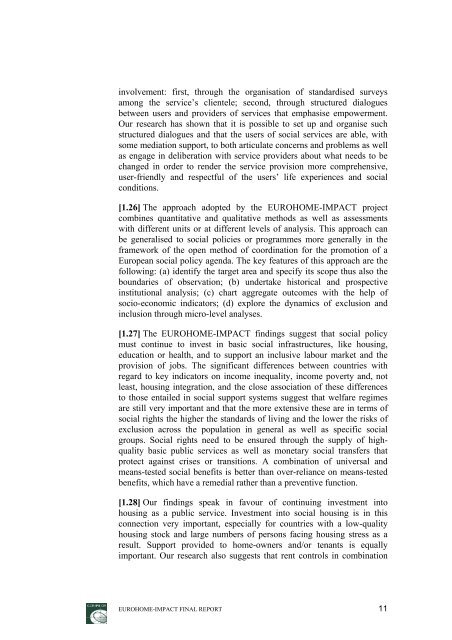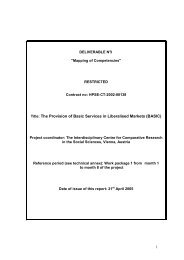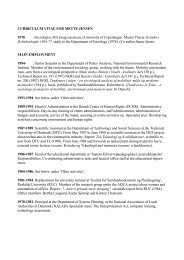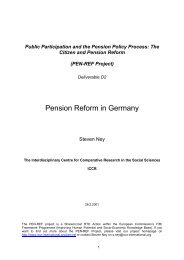The Housing Dimension of Welfare Reform - the ICCR
The Housing Dimension of Welfare Reform - the ICCR
The Housing Dimension of Welfare Reform - the ICCR
You also want an ePaper? Increase the reach of your titles
YUMPU automatically turns print PDFs into web optimized ePapers that Google loves.
involvement: first, through <strong>the</strong> organisation <strong>of</strong> standardised surveys<br />
among <strong>the</strong> service’s clientele; second, through structured dialogues<br />
between users and providers <strong>of</strong> services that emphasise empowerment.<br />
Our research has shown that it is possible to set up and organise such<br />
structured dialogues and that <strong>the</strong> users <strong>of</strong> social services are able, with<br />
some mediation support, to both articulate concerns and problems as well<br />
as engage in deliberation with service providers about what needs to be<br />
changed in order to render <strong>the</strong> service provision more comprehensive,<br />
user-friendly and respectful <strong>of</strong> <strong>the</strong> users’ life experiences and social<br />
conditions.<br />
[1.26] <strong>The</strong> approach adopted by <strong>the</strong> EUROHOME-IMPACT project<br />
combines quantitative and qualitative methods as well as assessments<br />
with different units or at different levels <strong>of</strong> analysis. This approach can<br />
be generalised to social policies or programmes more generally in <strong>the</strong><br />
framework <strong>of</strong> <strong>the</strong> open method <strong>of</strong> coordination for <strong>the</strong> promotion <strong>of</strong> a<br />
European social policy agenda. <strong>The</strong> key features <strong>of</strong> this approach are <strong>the</strong><br />
following: (a) identify <strong>the</strong> target area and specify its scope thus also <strong>the</strong><br />
boundaries <strong>of</strong> observation; (b) undertake historical and prospective<br />
institutional analysis; (c) chart aggregate outcomes with <strong>the</strong> help <strong>of</strong><br />
socio-economic indicators; (d) explore <strong>the</strong> dynamics <strong>of</strong> exclusion and<br />
inclusion through micro-level analyses.<br />
[1.27] <strong>The</strong> EUROHOME-IMPACT findings suggest that social policy<br />
must continue to invest in basic social infrastructures, like housing,<br />
education or health, and to support an inclusive labour market and <strong>the</strong><br />
provision <strong>of</strong> jobs. <strong>The</strong> significant differences between countries with<br />
regard to key indicators on income inequality, income poverty and, not<br />
least, housing integration, and <strong>the</strong> close association <strong>of</strong> <strong>the</strong>se differences<br />
to those entailed in social support systems suggest that welfare regimes<br />
are still very important and that <strong>the</strong> more extensive <strong>the</strong>se are in terms <strong>of</strong><br />
social rights <strong>the</strong> higher <strong>the</strong> standards <strong>of</strong> living and <strong>the</strong> lower <strong>the</strong> risks <strong>of</strong><br />
exclusion across <strong>the</strong> population in general as well as specific social<br />
groups. Social rights need to be ensured through <strong>the</strong> supply <strong>of</strong> highquality<br />
basic public services as well as monetary social transfers that<br />
protect against crises or transitions. A combination <strong>of</strong> universal and<br />
means-tested social benefits is better than over-reliance on means-tested<br />
benefits, which have a remedial ra<strong>the</strong>r than a preventive function.<br />
[1.28] Our findings speak in favour <strong>of</strong> continuing investment into<br />
housing as a public service. Investment into social housing is in this<br />
connection very important, especially for countries with a low-quality<br />
housing stock and large numbers <strong>of</strong> persons facing housing stress as a<br />
result. Support provided to home-owners and/or tenants is equally<br />
important. Our research also suggests that rent controls in combination<br />
EUROHOME-IMPACT FINAL REPORT 11









